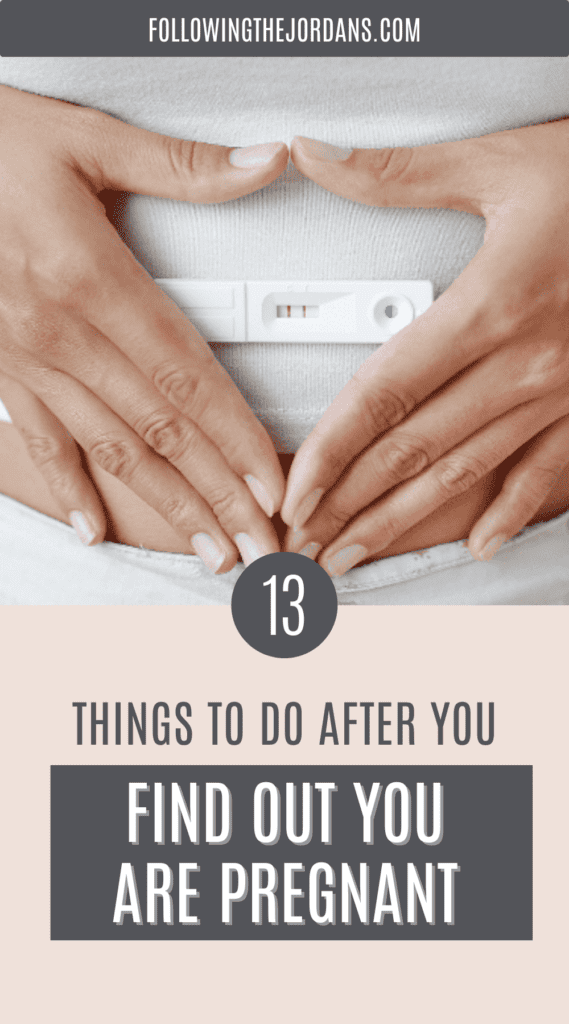13 Things to Do After You Find Out You’re Pregnant
The two lines appear on your pregnancy test, and your heart stops for a few moments. You just found out you’re pregnant – now what are you going to do? Once the shock runs through your body, you have plenty of things you need to do now that you know you’re expecting a new bundle of joy.
The moments and days after having a positive pregnancy test are full of emotions, and you may quickly realize you have a lot to get done before your baby realizes. You have to decide when to tell family and friends, find a doctor or healthcare provider you like, and start preparing for adding a new family to your life.
Plus, you’re pregnant! So, you need to take care of your body and focus on living a healthy lifestyle to keep both of you healthy. This begins a 40-week journey towards a new adventure in your life; here are some things to do after you find out you’re pregnant.
Pin this blog for later! ↓

Related: 11 Foods That Induce Labor – Is It Myth or Truth?
13 Things to Do After You Find Out You’re Pregnant
1. Take Another Pregnancy Test

When you get the first positive test, the first thing you should do is take another pregnancy test. Many mothers want to have the extra reassurance that they really are pregnant before feeling the excitement.
It’s important to know that false positives are less common than false negatives. Chances are if you get a positive pregnancy test, you are pregnant because the test looks for the hCG hormone in your urine, which is only detectable during pregnancy.
2. Figure Out Your Due Date
Once you know you’re pregnant, it’s time to figure out your due date. You can use a due date calculator, assuming you know your last previous pregnancy.
3. Tell Your Partner
Now, you get to tell your partner that you’re expecting – such an exciting time. You have all sorts of ways to share this amazing news from simply sitting them down and telling them to getting a present to share the news!
4. Make Sure Your Medication is Pregnancy Safe
Not all medications are safe for pregnancy, so if you’re on a daily medication, it’s best to call your doctor immediately to determine if it’s safe to continue taking it.
It’s also a good idea to learn what medications are safe during pregnancy. For example, ibuprofen is typically not recommended to take during pregnancy, so you will need to switch over to Tylenol. You’ll also want to know what cold medications are safe for you to take.
5. Contact Your OBGYN for an Appointment
You have to make your first appointment with your healthcare provider or midwife. This is the appointment that will establish your care and receive your official due date. The first appointment typically happens between 8 to 10 weeks, so you often have several weeks between finding out you’re pregnant and your first appointment,
6. Decide When You Want to Announce Your Pregnancy

Something else you need to do when you find out you’re pregnant is decide when you want to announce your pregnancy. This is a personal decision with no right or wrong decision, and if you ask your friends, everyone will give you a different thought.
Some women want to announce immediately, but the first trimester is the time when miscarriages are most common. Women fear having to tell friends and family that they lost a baby, but remember, babies deserve to be celebrated and many women have miscarriages. You may get the most support this way!
On the other hand, you may prefer to wait until the second trimester, or you could have a particular date or holiday in mind.
This is totally up to you!
7. Begin Taking Your Prenatal Vitamins
Prenatal vitamins are essential during pregnancy, so once you find out you’re pregnant, you’ll want to take this step to ensure a healthy pregnancy. All pregnant women need extra folate to help their development. Getting enough folate into your diet without prenatal vitamins is quite difficult.
Taking prenatal vitamins also helps reduce the risk of birth defects; this risk is highest in your early pregnancy weeks.
8. Start Documenting Your Pregnancy
It’s never too early to start documenting your pregnancy. Grab a pregnancy journal and write down what you’re feeling, changes you notice, and other things.
This may seem like a silly thing to do, but a lot of things happen throughout your pregnancy, and it’s fun to go back and read what you were thinking or feeling. It’s also a great way to compare following pregnancies. It’s quite amazing how different each pregnancy often are.
9. Download an App to Track Your Pregnancy
Years ago, pregnancy apps weren’t a thing, but now, you can download a range of apps to track everything to do with your pregnancy. These apps tell you how big your baby is each week during pregnancy, along with a lot of information.
Pregnancy apps allow you to keep track of your appointments, your weight gain and blood pressure, and your symptoms. Many apps send you weekly updates, telling you what is happening with your baby each week. It’s fascinating to learn how your baby develops over these next 40 weeks.
10. Take Weekly Bump Pictures

I loved taking weekly bump pictures throughout my pregnancies. You might not take them weekly; some prefer monthly pregnancy photos.
Either way, it’s great to document your body changes, and you can compare each pregnancy. Many women notice their bumps get bigger and start popping sooner with each following baby they have.
11. Moisturize Your Skin – Everywhere
Women often want to avoid stretch marks; you can develop them all over your body during pregnancy like your belly, thighs, butt, and more. Your body grows and changes a lot in a short period.
Start slathering on the lotion in your first trimester. Some women swear that the earlier they used lotion, the fewer stretch marks they have.
12. Focus on a Healthy, Safe Pregnancy
Now that you are pregnant, it’s time to focus on an overall safer and healthier pregnancy. Here are some suggestions.
- Stop Smoking. Smoking is not healthy during pregnancy, so as soon as you find out you’re pregnant, it’s time to stop.
- Stop Drinking. Alcohol is harmful to your baby’s development, and it’s not safe to consume any during pregnancy. It’s best to avoid entirely to keep your baby safe.
- Stay Moving & Active. Exercising during pregnancy is great for your overall health. If you’ve been exercising before you’re pregnancy, it’s safe to continue your regular routine. If you want to start exercising after finding out you’re expecting, start simple with daily walks or yoga.
- Learn What Foods to Avoid. A balanced diet is another essential part of pregnancy to keep you and your baby safe. You should avoid foods high in sugar, salt, and fat, and some foods are a no-no like sushi.
- Eat a Balanced Diet: Having a healthy pregnancy is your goal, so start working to eat a balanced diet. You want plenty of fruits and vegetables, lean meats, whole grains, and healthy fats in your diet.
- Adjust Your Caffeine Intake: You might love to drink five cups of coffee per day, but it’s not recommended. It’s best to ingest no more than 200mg of caffeine each day during pregnancy.
13. Learn How to Manage First Trimester Symptoms Early
You’re likely to experience symptoms in your first trimester; morning sickness is the most common. Symptoms appear by six to seven weeks, and it varies from pregnancy to pregnancy. Since you will more than likely experience symptoms, you want to learn how to manage them, especially nausea and morning sickness.
These symptoms typically won’t last your entire pregnancy; they tend to subside during the second trimester.
Once you have time to process the exciting news that you’re pregnant, it’s time to start getting into the healthy pregnancy mode and planning everything for your pregnancy! It’s such an exciting time in your life.






